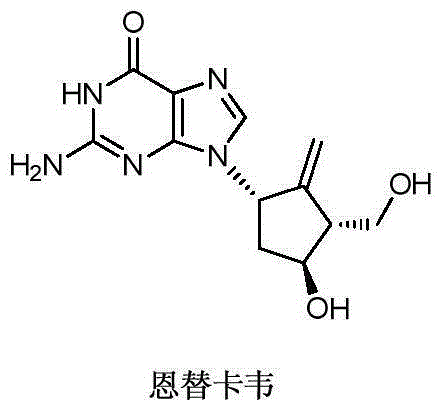Novel synthetic method for entecavir compound
A technology of entecavir and synthetic method, which is applied in the field of new synthesis of entecavir compounds, can solve the problems of expensive process route, high technical requirements of the method, and rare raw materials
- Summary
- Abstract
- Description
- Claims
- Application Information
AI Technical Summary
Problems solved by technology
Method used
Image
Examples
Embodiment 1
[0101] 1) Synthesis of compound 2
[0102]
[0103] (S)-Dimethyl 3-hydroxyadipate (190.2g, 1mol) was dissolved in 2000ml of dichloromethane, and imidazole (81.7g, 1.2mol) and TBSCl (165.8g, 1.1mol) were added successively, and the reaction solution Stir at room temperature for 4 hours. 1500ml of water was added to quench the reaction, the layers were separated, the organic phase was washed twice with 2000ml of water, dried over anhydrous sodium sulfate, filtered, and concentrated under reduced pressure to obtain compound 2 (289.25g, yield 95%).
[0104] 2) Synthesis of Compound 2
[0105]
[0106] (S)-Dimethyl 3-hydroxyadipate (190.2g, 1mol) was dissolved in 2000ml tetrahydrofuran, and pyridine (103.1g, 1.3mol) and TBSCl (180.9g, 1.2mol) were added successively, and the reaction solution was heated at room temperature Stirring was continued for 3 hours. 1500ml of water was added to quench the reaction, the layers were separated, and the organic phase was washed twice ...
Embodiment 2
[0108] 1) Synthesis of compound 3
[0109]
[0110] Compound 2 (228.35g, 750mmol) was dissolved in 12500ml methanol, 25% sodium methoxide methanol solution (486g, 2250mmol) was added, and heated to reflux for 3 hours. After the reaction was completed, methanol was removed by concentration under reduced pressure. The residue was added to 5000ml of 0.5M hydrochloric acid solution, extracted with 2500ml of dichloromethane, the organic phase was washed twice with 2500ml of water, dried over anhydrous sodium sulfate, filtered, concentrated under reduced pressure, and the crude product was subjected to column chromatography (petroleum ether / ethyl acetate=80: 1) Compound 3 (147.1 g, yield 72%) was purified.
[0111] 2) Synthesis of compound 3
[0112]
[0113] Compound 2 (243.6 g, 0.8 mol) was dissolved in 12500 ml of tert-butanol, 25% potassium tert-butoxide (t-BuOK) in tert-butanol (179.5 g, 1.6 mol) was added, and heated to reflux for 2 hours. After the reaction, tert-but...
Embodiment 3
[0115] 1) Synthesis of compound 4
[0116]
[0117] Compound 3 (136.2g, 500mmol) was dissolved in 280ml of toluene, ethylene glycol (93.1g, 1500mmol) and p-toluenesulfonic acid monohydrate (7.6g, 40mmol) were added, heated to reflux to separate water, and reacted for 8 hours. After no moisture is produced, stop heating and cool to room temperature. Add 750ml of saturated sodium bicarbonate solution and stir for 10 minutes, separate the organic phase, wash twice with 1000ml of water, dry over anhydrous sodium sulfate, filter, and concentrate under reduced pressure to obtain compound 4 (145.6g, yield 92%).
[0118] 2) Synthesis of Compound 4
[0119]
[0120] Compound 3 (136.2g, 500mmol) was dissolved in 280ml of dichloromethane, ethylene glycol (62.1g, 1000mmol) and pyridine hydrochloride (5.8g, 50mmol) were added, heated to reflux to separate water, reacted for 9 hours, and waited until no After moisture is generated, stop heating and cool to room temperature. Add 750...
PUM
 Login to View More
Login to View More Abstract
Description
Claims
Application Information
 Login to View More
Login to View More - R&D
- Intellectual Property
- Life Sciences
- Materials
- Tech Scout
- Unparalleled Data Quality
- Higher Quality Content
- 60% Fewer Hallucinations
Browse by: Latest US Patents, China's latest patents, Technical Efficacy Thesaurus, Application Domain, Technology Topic, Popular Technical Reports.
© 2025 PatSnap. All rights reserved.Legal|Privacy policy|Modern Slavery Act Transparency Statement|Sitemap|About US| Contact US: help@patsnap.com



